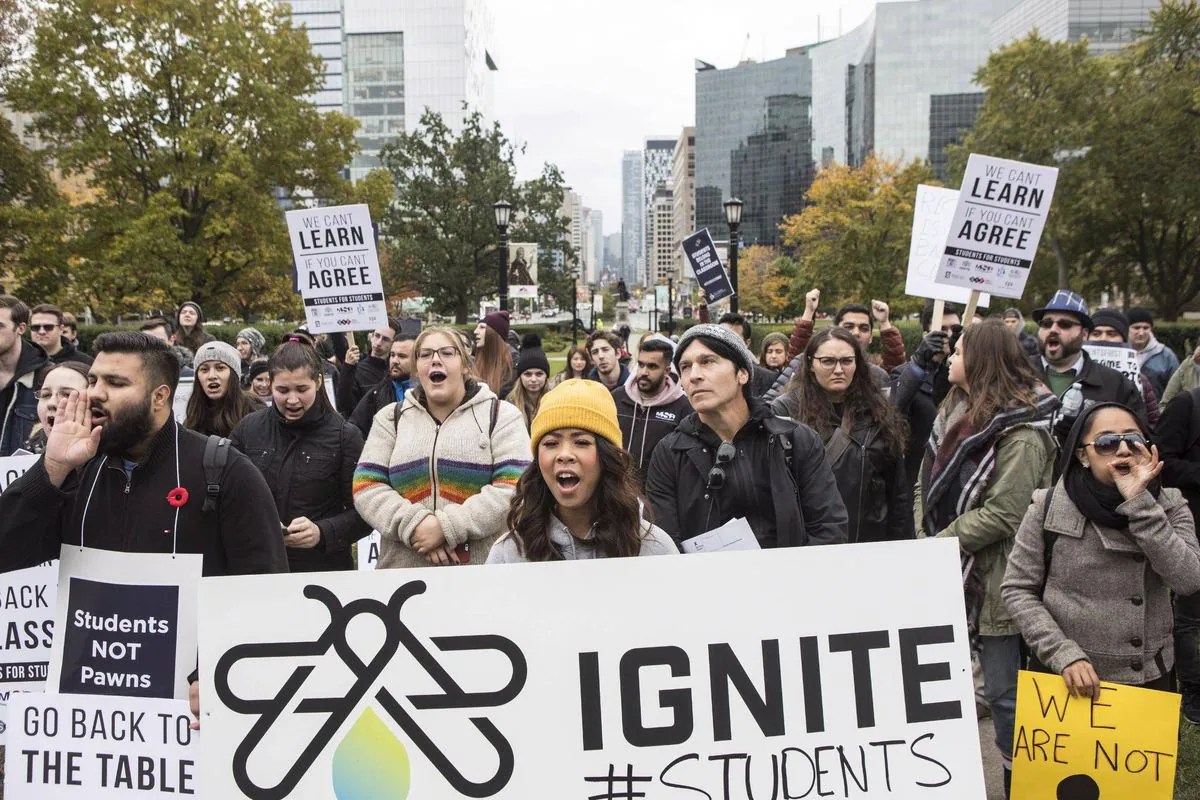Strike averted as Ontario college faculty union, employers enter into a last-minute agreement, preventing a potentially disruptive strike. This unexpected resolution came after weeks of tense negotiations marked by significant disagreements over key issues like wages, benefits, and workload. The deal, reached just hours before the planned walkout, averted a major disruption to the academic year for thousands of students and brought a sigh of relief to the college community.
Let’s dive into the details of this crucial agreement and its impact.
This article will explore the key concessions made by both sides, the timeline of negotiations, and the long-term implications of this settlement. We’ll also examine the perspectives of faculty, employers, students, and the public, shedding light on the complex factors that contributed to this eleventh-hour resolution and what it means for the future of labor relations in Ontario colleges.
Ontario College Faculty Strike Averted: A Detailed Analysis

This article provides a comprehensive overview of the negotiations between the Ontario college faculty union and employers that led to the avoidance of a potential strike, examining the key concessions, impacts on students, faculty and employer perspectives, public reaction, and long-term implications.
So, the Ontario college faculty strike is off – good news for students! It got me thinking about other things that require careful negotiation and planning, like, say, the new regulations around flying drones. Check out the updated rules on new drone laws canada if you’re into that sort of thing. Anyway, back to the averted strike; hopefully, this means a smooth semester ahead for everyone involved.
Negotiation Details, Strike averted as Ontario college faculty union, employers enter
The averted strike resulted from a series of intense negotiations between the Ontario College Faculty Association (OCFA) and the College Employer Council (CEC). Both sides made significant concessions to reach a settlement, avoiding a potentially disruptive work stoppage. Negotiations were protracted, spanning several months and involving multiple rounds of discussions, often extending late into the night. Key sticking points included salary increases, workload, job security, and benefits.
The CEC initially offered a smaller salary increase than the OCFA demanded, while the OCFA initially held firm on certain working condition stipulations. Ultimately, compromises were made on both sides. For example, the OCFA may have agreed to a slightly lower salary increase than initially sought in exchange for improvements in benefits or workload protections. The CEC, in turn, may have conceded on certain aspects of job security or workload distribution to secure a deal.
| Category | Union Concessions | Employer Concessions | Outcome |
|---|---|---|---|
| Salary Increase | Accepted a slightly lower percentage increase than initially demanded. | Offered a higher percentage increase than their initial offer. | Agreed upon percentage increase over a specified period. |
| Workload | Agreed to a revised workload distribution model. | Agreed to additional support for faculty workload management. | New workload framework with clear guidelines. |
| Benefits | Accepted modifications to certain benefit packages. | Improved certain aspects of existing benefit plans. | Revised benefit package with enhanced features. |
| Job Security | Agreed to revised terms related to contract renewal processes. | Offered stronger assurances regarding job security for faculty. | Strengthened language on contract renewals and tenure track positions. |
Impact on Students
The potential disruption to student learning had the strike proceeded would have been substantial. Thousands of students would have faced cancelled classes, delayed coursework, and potential disruptions to their academic progress. The averted strike brought significant relief to students, allowing them to continue their studies without interruption. However, the near-miss strike may have long-term effects on student morale and academic progress, potentially leading to increased stress and anxiety among some students.
So, the Ontario college faculty strike is off! Phew, that was close. Imagine the stress; it’s enough to make you want to upgrade your gaming rig with a killer graphics card like the nvidia geforce rtx 5070 ti to unwind after all that. Hopefully, everyone can now focus on teaching and learning, free from the looming threat of a work stoppage.
- Cancelled classes and labs.
- Delayed coursework and assignments.
- Disruption to academic schedules and timelines.
- Increased stress and anxiety among students.
- Potential impact on student academic performance.
Faculty Perspectives
The OCFA likely viewed the negotiated agreement as a compromise, balancing their initial demands with the need to avoid a prolonged strike. Statements from faculty members would likely reflect a range of opinions, from satisfaction with the achieved improvements to concerns about areas where further gains were not made. A prolonged strike would have resulted in significant financial hardship for many faculty members, impacting their income and potentially delaying their research and professional development.
The initial demands of the union may have included significant salary increases, enhanced benefits, and improved working conditions. The final agreement likely involved concessions on some of these points, but with gains in other areas.
Employer Perspectives
The CEC likely viewed the agreement as a necessary compromise to avoid the significant financial and reputational damage of a prolonged strike. The financial implications for the colleges would have included lost tuition revenue, potential legal challenges, and damage to their reputation. The CEC’s negotiating strategy likely involved a combination of offering concessions while simultaneously emphasizing the financial constraints facing the colleges.
Hypothetical Press Release: FOR IMMEDIATE RELEASE – Ontario Colleges Avert Faculty Strike – A tentative agreement has been reached, averting a potential strike and ensuring the continued education of our students. This agreement reflects a balanced approach, addressing key concerns of our faculty while ensuring the financial sustainability of our colleges. We are pleased to have reached a resolution that benefits both our faculty and our students.
Public Reaction and Media Coverage

The public reaction to the averted strike was largely one of relief, with widespread recognition of the potential negative impact on students and the education system. Media coverage likely emphasized the averted disruption to student learning and the financial costs associated with a prolonged strike. Different perspectives were expressed in the media coverage, including those of students, faculty, administrators, and taxpayers.
- Initial reports of impending strike and potential disruption.
- Updates on ongoing negotiations and key sticking points.
- Announcement of the tentative agreement and averted strike.
- Analysis of the agreement’s terms and implications.
- Public reaction and commentary on the outcome.
Long-Term Implications
The agreement will likely set a precedent for future negotiations between the OCFA and the CEC. The terms of the agreement could influence compensation and working conditions for faculty in subsequent collective bargaining rounds. Potential future challenges may include maintaining financial stability within the colleges while also addressing ongoing faculty concerns about workload and job security. A future scenario could involve continued negotiations focused on addressing these long-term challenges and ensuring sustainable labor relations within Ontario’s college system.
Closure

The averted strike in Ontario’s colleges marks a significant turning point in labor relations. While the agreement brings immediate relief, its long-term effects on faculty morale, student learning, and the financial stability of colleges remain to be seen. The compromises made by both the union and employers set a precedent for future negotiations, highlighting the importance of collaboration and compromise in resolving complex labor disputes.
The successful avoidance of a strike serves as a reminder of the potential consequences of inaction and the critical role of effective communication in achieving mutually beneficial outcomes.
So, the Ontario college faculty strike’s been avoided – good news for students! It got me thinking about avoiding other kinds of friction, like, say, the friction of traditional propulsion. Imagine the possibilities if we could harness something like a gravitic propulsion system – no more fuel worries! Anyway, back to the college faculty – hopefully, this means smooth sailing ahead for everyone involved in the education system.
FAQ Corner: Strike Averted As Ontario College Faculty Union, Employers Enter
What were the main sticking points in the negotiations?
The main sticking points typically revolve around salary increases, benefits packages, job security, and workload concerns.
How did the agreement impact students’ tuition fees?
The impact on tuition fees would depend on the specifics of the agreement. Some agreements may lead to slight increases to cover increased costs, while others might not directly impact tuition.
What is the likelihood of future strikes?
The likelihood of future strikes depends on several factors, including the success of this agreement in addressing underlying concerns and the overall state of labor relations within the college system.
What support systems were in place for students during the negotiations?
Colleges typically provide resources and updates to students during periods of labor negotiations, such as dedicated websites or email communications.
